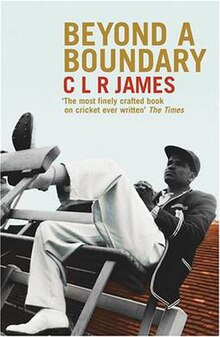Beyond a Boundary

2005 UK Printing
|
|
| Author | C. L. R. James |
|---|---|
| Country | Trinidad / United Kingdom |
| Language | English |
| Publisher | Hutchinson, (1963) |
|
Publication date
|
1963, 2005 (US 1982, 1993) |
| ISBN | |
| OCLC | 58998824 |
| LC Class | GV917 .J27 2005 |
| Preceded by | Party Politics in the West Indies (1962) |
| Followed by | A History of Pan-African Revolt (1969) |
Beyond a Boundary (1963) is a memoir on cricket written by the Trinidadian Marxist intellectual C. L. R. James, which he described as "neither cricket reminiscences nor autobiography". It mixes social commentary, particularly on the place of cricket in the West Indies and England, with commentary on the game, arguing that what happened inside the "Boundary Line" in cricket affected life beyond it, as well as the converse. The book is in a sense a response to a Rudyard Kipling quote from the poem "English Flag": "What should they know of England who only England know?", which James in his Preface revised to: "What do they know of cricket who only cricket know?"
James recounts the role cricket played in his family's history, and his meetings with such early West Indian players as George John, Wilton St Hill, the great batsman George Headley and the all-rounder Learie Constantine, but focuses on the importance of the game and its players to society, specifically to colonial era Trinidad. James argues for the importance of sport in history, and refers to its roots in the Olympic Games of Ancient Greece. He documents the primacy of W. G. Grace in the development of modern cricket, and the values embraced by cricket in the development of the cultures of the British Empire. He approaches cricket as an art form, as well as discussing its political impact - particularly the role of race and class in early West Indian cricket. "Cricket", he writes, "had plunged me into politics long before I was aware of it. When I did turn to politics, I did not have too much to learn." Cricket is approached as a method of examining the formation of national culture, society in the West Indies, the United Kingdom, and Trinidad. Education, family, national culture, class, race, colonialism, and the process of decolonisation are all examined through the prism of contemporary West Indian cricket, the history of cricket, and James's life as a player of—and commentator and writer on—the sport of cricket.
...
Wikipedia
